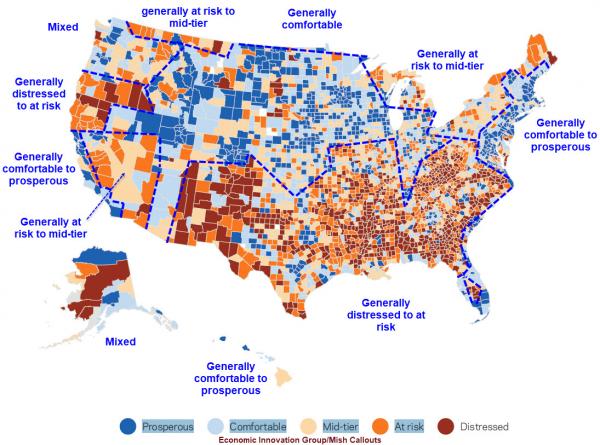
Fan Ho The Evening of Life 1963
“Forget Germany, Spain Is The Real Problem”, reads a headline. Eh… no. Germany is definitely the problem in Europe. Spain is a bit player. That doesn’t mean nothing major could happen in Spain in its fight with Catalonia, and soon, but Spain, like all EU nations, is a de facto province of Germany.
What matters in the end is how Brussels and Merkel deal with Spain. And while it’s tempting to say that perhaps Brussels, the EU, is the main European problem, the European Union is run exclusively by and for Germany, so that doesn’t work either.
The only thing that might work if you really want to find a bigger issue than Germany is if you would point at the role the incessant lies about economic conditions for people play. But that’s not a European issue, that’s global.
The talk about how economies are recovering, how there’s light at the end of the tunnel, and how any day now we’ll be back to where we were at some point in time that many can not even remember. But then, at least when it comes to Europe, that happy talk comes from Germany too, to a large degree. Just wait till Draghi starts cutting his QE.
You can try and tell people that they’re doing just great, using the media you control, and it’ll work for a stretch, if only because they want to believe it, badly, but when these same people can’t even feed their children while you make such claims, you will eventually lose their attention and support. The difference between beliefs and experiences.
If you’re a politician, you try to feed people what they want to hear, invariably an upbeat message, but there comes a time when you have to back it up. You can say that austerity is necessary, inevitable, and the only choice, and it will be beneficial to them, but austerity is one of those things that have a very limited best before date.
If you can only make employment numbers look good by creating a gig economy that takes away all their benefits, and their entire sense of security, they’re going to turn their backs on you. Because you’re lying.
Rising inequality is a one way street right up to the point where it turns into a dead end alley. Inequality breeds more inequality until it no longer can, until people say ‘I want that cake you are having because my kids are hungry. And I brought a pitchfork’.
That is where we’re at, and that is why Merkel lost some 25% of her votes. That is why there’s Trump and Brexit, and why an impossible candidate like Marine Le Pen in France gathered so much attention and support. It’s why eastern European countries will start fighting Brussels and Berlin much harder than they have to date, and why Berlin will fight back harder than it has. Poor Greece.
In the US, there’s only one party, and it divvies up the spoils of very rich campaign contributions. Bernie Sanders tried to circumvent this; not a chance. Trump succeeded. In Britain, there was no difference between left and right for a long time, and no alternative party either. That led to Brexit. In France, Macron started a whole new party from scratch and somehow got it funded (bankers?!). It wiped the left off the map.
The same happened in Holland, where like in France the right wing alternative was judged too unpalatable by too many. No left left. The leaders of Germany’s Alternative für Deutschland do not have the visibility for that yet. In Italy, Five Star have a good shot at the throne. Greece’s Syriza already overtook both left and right. In eastern Europe, right wing parties often didn’t even have to overthrow an existing order, they could just slide in.
The pattern is so obvious only those who stand to lose from acknowledging it end up not seeing it, or telling themselves it’s all just an incident. But it’s not, because the shrinking economies everywhere are not. When left and right, either in public or in practice, rule a country together and their promises don’t hold up, people will look for a way out. If far right is the only way available, they will pick that.
It’s not because they’re all nazis or something like that. But people do lean towards smaller units of organization, decentralization, when they get poorer. And despite all the talk of recovery, that is what most people have seen happen to their lives, while their leaders told them they’re just fine. So you get this kind of headline (and map) for the US (h/t Mish/ZH).
Large Parts Of America Are Being Left Behind
Economic prosperity is concentrated in America’s elite zip codes, but in an interesting report on Distressed Communities, from The Economic Innovation Group, it is increasingly clear that economic stability outside of those communities is rapidly deteriorating. As Axios noted, this isn’t a Republican or Democratic problem. At every level of government, both parties represent distressed areas. But the economic fortunes of the haves and have-nots have only helped to widen the political chasm between them, and it has yet to be addressed by substantial policy proposals on either side of the aisle. Economic Prosperity Quintiles.

And a very similar headline appears in the Guardian in a report about the German election.
‘A Lot of People Feel Left Behind’: Voters on the Far-Right Surge in Germany
Sarah, 37, teacher, Bonn: “A lot of people feel left behind. They are looking for scapegoats. It is the easy way to deal with problems. The AFD makes use of this feeling. With the grand coalition, there was no real debating culture left. The CDU went too much into the middle, leaving the right out. Just like the SPD under Schröder left the left-wing out.”
Perhaps a lot of those who voted for Trump, and Brexit, Le Pen, Wilders, the AfD, are not so much looking for scapegoats, they’ve identified those as their incumbent politicians; they’re instead looking for a way away from them. All these people who feel left behind base that feeling primarily on their deteriorating economic circumstances. And if the only alternative they have rants, against foreigners and immigrants, they’ll go with that.
Angela Merkel pushed over 1 million refugees and immigrants down the German population’s throats. She never asked their opinion. But many Germans are not doing any better than many Americans or French or British. So the consequences of such things are predictable. You have to explain, you have to communicate with your people. Just saying ‘we can do this’ is not enough. No more than ‘change we can believe in’ was. It’s just hollow.
Merkel lost ‘only’ 25% of her votes. Because Germans know what right wing is, and what it can do. Germany is not full of nazis, no more than America is. Both countries just have a lot of people who feel trapped in a web of lies, and their existing and alleged democratic systems offer no way out of that web.
All these countries, the people and their politicians, have the tendency to see their situations as somehow unique, but they’d be much better off looking at what they have in common with others.
The only solution is to tell people the truth, that the incumbent political class has screwed up badly because of limited brain capacity and unlimited greed, and that they should elect people next time who are both smarter and less sociopathic. But that is not something that comes voluntarily, that takes a battle. And it tends to end careers, and lives.
That is what we can expect. In many different shapes and forms, but all for the same underlying reasons. You can’t fool all of the people all of the time, you can’t even fool a majority for long. You can only fool a limited number of them for a limited amount of time.
Well, time’s up.









Home › Forums › Left Behind